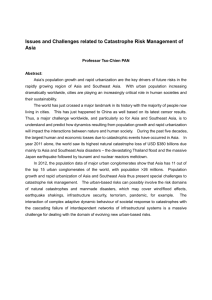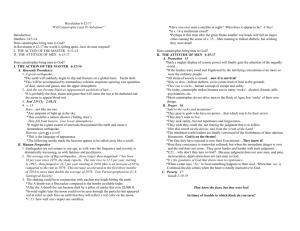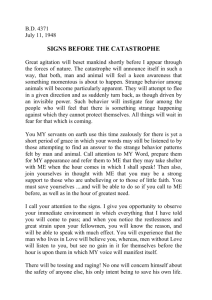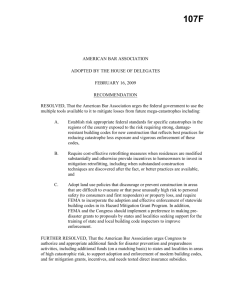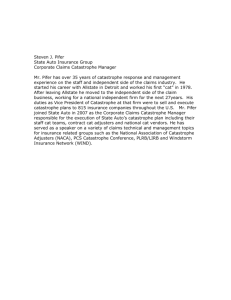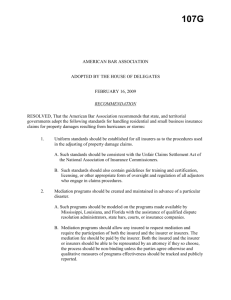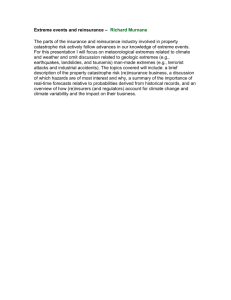AMERICAN BAR ASSOCIATION
advertisement
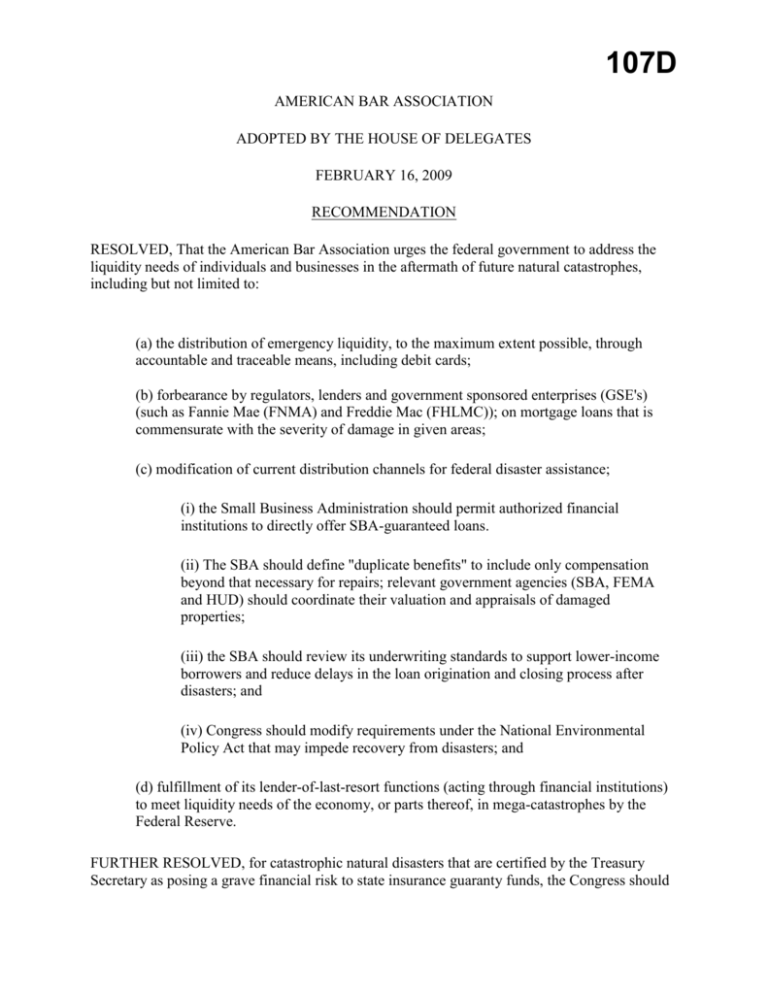
107D AMERICAN BAR ASSOCIATION ADOPTED BY THE HOUSE OF DELEGATES FEBRUARY 16, 2009 RECOMMENDATION RESOLVED, That the American Bar Association urges the federal government to address the liquidity needs of individuals and businesses in the aftermath of future natural catastrophes, including but not limited to: (a) the distribution of emergency liquidity, to the maximum extent possible, through accountable and traceable means, including debit cards; (b) forbearance by regulators, lenders and government sponsored enterprises (GSE's) (such as Fannie Mae (FNMA) and Freddie Mac (FHLMC)); on mortgage loans that is commensurate with the severity of damage in given areas; (c) modification of current distribution channels for federal disaster assistance; (i) the Small Business Administration should permit authorized financial institutions to directly offer SBA-guaranteed loans. (ii) The SBA should define "duplicate benefits" to include only compensation beyond that necessary for repairs; relevant government agencies (SBA, FEMA and HUD) should coordinate their valuation and appraisals of damaged properties; (iii) the SBA should review its underwriting standards to support lower-income borrowers and reduce delays in the loan origination and closing process after disasters; and (iv) Congress should modify requirements under the National Environmental Policy Act that may impede recovery from disasters; and (d) fulfillment of its lender-of-last-resort functions (acting through financial institutions) to meet liquidity needs of the economy, or parts thereof, in mega-catastrophes by the Federal Reserve. FURTHER RESOLVED, for catastrophic natural disasters that are certified by the Treasury Secretary as posing a grave financial risk to state insurance guaranty funds, the Congress should 107D give the Treasury Department the authority to lend to those state funds to assure prompt payment of claims when there has been a demonstration of need to avoid guaranty fund insolvency. FURTHER RESOLVED, That the federal government should provide incentives to encourage catastrophe risk-taking by private insurers: the federal government and the Financial Accounting Standards Board ("FASB") could recognize and allow for multi-year tax-deferred catastrophe reserves to be established by insurers and other parties at risk for natural catastrophes and allow annual net additions to such reserves. Such incentives or reserves should be restricted to paying claims for future mega-catastrophes. Congress could also provide incentives to homeowners and businesses that invest in catastrophe mitigation measures in high-risk areas. 107D REPORT As a result of Hurricanes Katrina and Rita, there had been widespread criticism of the insurance system as it relates to the kinds of disasters precipitated by hurricanes and storms. In response, in the spring of 2007, Peter Neeson, Chair of the ABA Tort Trial & Insurance Practice Section (TIPS), appointed the Task Force on Disaster Insurance Coverage. The Task Force was reappointed the following year by the next Chair of TIPS, Peter Bennett. Task Force Mission The specific mission of the Task Force was "to examine insurance coverage difficulties arising from the hurricanes, including (1) why so much litigation has surfaced in surrounding states over the wind/water issue, and (2) why insurers are departing from hurricane-prone areas in Florida and along the entire east coast. The scope of the Task Force's research has included the full range of issues arising out of insurance coverage, availability, and affordability for hurricanes and storms and the executive, administrative, legislative, and judicial framework for addressing such issues. The Task Force extends its gratitude to its ex officio members representing various stakeholders for their outstanding contributions to the difficult work of the Task Force. However, it is important to stress that the positions expressed in this Report and Recommendations, while resulting in an overall general consensus, does not necessarily represent the opinions of the entire ex officio membership or their respective policies. Meetings, Hearings, and Deliberations of the Task Force The Task Force met on May 18, 2007 in Newport Beach, CA; August 12, 2007 in San Francisco, CA; October 6, 2007 in Palm Beach, FL; February 9 2008 in Los Angeles. CA; April 15, 2008 in Washington, D.C.; August 9, 2008 in New York City, N.Y.; September 22, 2008 in Chicago, IL; and October 4, 2008 in Hilton Head, SC. It heard presentations from a wide variety of officials from the insurance industry, state and federal governments, and consumer and other non-governmental organizations. Concerns with the Present Insurance System Following Hurricanes Katrina and Rita some national insurers moved to terminate existing policies, or to cease writing new policies entirely, in coastal areas ranging from Florida to New England. A few states moved to establish state mechanisms for the hurricane insurance business, while others looked to Washington for a solution. Various hearings and investigations were initiated by Congressional and state legislators, state insurance regulators, and certain attorneys general, and the Task Force has reviewed the testimony and proposals that have resulted from this process. 3 107D From the presentations and effort conducted by the Task Force, it was noted that, among other things, some raised “concerns” about adequacy of coverage provided under insurance policies and the National Flood Insurance Program (NFIP) in regard to wind and water damage, the varying interpretations of "anticoncurrent cause" provisions in insurance policies and questions of enforcement, promptness and/or consistency surrounding claims determinations during times of catastrophe. The Task Force while having considered the referenced “concerns” recognized that it was not a fact-finding body and did not express any view on the accuracy or validity of such matters revealed or discussed in the course of its efforts. In furtherance of its mission, the Task Force proposals intend to address both possible causes and solutions to challenges inherent in the present insurance system, including the NFIP, and those arising from mega catastrophes in seven separate but highly integrated Recommendations. Recommendation “107D” This Recommendation “107D” concerns the steps that primarily the federal government could take in order to speed recovery after a natural disaster and thereby reduce some of the losses incurred by the residents affected by the catastrophes. It recommends three approaches that would assist in meeting the liquidity needs of individuals and businesses. First, the federal government should distribute emergency liquidity, to the maximum extent possible, through accountable and traceable means including debit cards. Second, regulators, lenders and housing government sponsored enterprises (GSE's) should forbear, or support the offering of forbearance, on mortgage loans, as is consistent with the severity of damage in given areas. Third, Congress and various federal agencies should modify current distribution channels for federal disaster assistance. The Small Business Administration would have a key role in this third approach. Authorized financial institutions should be permitted to directly offer SBA-guaranteed loans. The SBA should define "duplicate benefits" to include compensation beyond that necessary for repairs. Such relevant government agencies as SBA, FEMA and HUD should coordinate their valuation and appraisals of damaged properties. And finally, the SBA should review its underwriting standards to support lower-income borrowers and reduce delays in the loan origination and closing process after disasters. Congress, in turn, should modify requirements under the National Environmental Policy Act that could impede recovery from disasters. The Federal Reserve should also be ready to serve as a lender-of-last-resort function by acting through financial institutions to meet liquidity needs of the economy. The Treasury Department should be given additional authority. If the Treasury Secretary certifies a natural disaster as posing a grave financial risk to state insurance guaranty funds, Congress should give the Treasury Department authority to make loans 107D to those state funds in order to assure prompt payment of claims to avoid guaranty fund insolvency. This Recommendation also calls for incentives to encourage catastrophe risktaking by private insurers. One option for the federal government and the Financial Accounting Standards Board ("FASB”) would be to allow for multi-year tax-deferred catastrophe reserves to be established by insurers and other parties at risk for natural catastrophes and permit annual net additions to such reserves. These reserves should be restricted to paying claims for future mega-catastrophes. Congress could also provide incentives to homeowners and businesses that invest in catastrophe mitigation measures in high-risk areas. Respectfully submitted, Timothy Bouch, Chair Tort Trial and Insurance Practice Section February 2009 5 107D GENERAL INFORMATION FORM Submitting Entity: Tort Trial and Insurance Practice Section Submitted By: Timothy W. Bouch, Chair 1. Summary of Recommendation(s). As one of seven integrated and highly interdependent set of Recommendations to reduce the nature and extent of post hurricane (catastrophe) litigation, this Recommendation addresses the steps that primarily the federal government and others could take in order to speed recovery after a natural disaster and thereby reduce some of the losses incurred by the residents affected by the catastrophes. Federal action: distribute emergency liquidity, cause or support the offering of temporary forbearance on mortgage loans and modify current distribution channels for federal disaster assistance (SBA loans, FEMA and HUD co-ordination, Federal Reserve service as lender of last resort, Treasury assistance as backstop to state guaranty funds). Tax code incentives are urged to encourage catastrophe risk-taking by private insurers and investment credits for investments in catastrophe mitigation measures in high-risk areas by homeowners and businesses. Finally, the Federal Government and the Financial Accounting Standards Board ("FASB”) are urged to allow for multi-year tax-deferred catastrophe reserves to be established by insurers and other parties at risk for natural catastrophes to be used solely for natural catastrophes, and permit annual net additions to such reserves. 2. Approval by Submitting Entity. Approved by the Council of the Tort Trial and Insurance Practice Section on October 5, 2008 3. Has this or a similar recommendation been submitted to the House or Board previously? No. 4. What existing Association policies are relevant to this recommendation and how would they be affected by its adoption? Not applicable 5. What urgency exists which requires action at this meeting of the House? Reducing the burden of class-action lawsuits on state and federal courts following hurricanes and other storms is projected to be a complex 10 year project involving multiple levels of governments, regulatory agencies, private insurers and related entities. The next hurricane season begins June 1. (See Status of Legislation) 6. Status of Legislation. (If applicable.) Not applicable. [Although there were hundreds of bills referencing “flood” and “hurricane” in the 110th Congress, including the main set of bills (HR 920, HR 1682, HR 3121 and S 2284), the House passed HR 3121 “Flood Insurance Reform & Modernization Act of 2007” was amended by the Senate by 107D substituting S 2284 and was languishing in Conference when Congress adjourned. New legislation is expected to be filed after the 111th Congress convenes.] 7. Cost to the Association. (Both direct and indirect costs.) Not applicable 8. Disclosure of Interest. (If applicable.) Not applicable 9. Referrals. This Report and Recommendation is referred to the Chairs and Staff Directors of all ABA Sections and Divisions. 10. Contact Persons. (Prior to the meeting.) a) Hervey P. Levin Law Offices of Hervey P. Levin 6918 Blue Mesa Drive Dallas, Texas 75252 972-733-3242-O 972-896-4312-Cell hervey@airmail.net b) James F. Carr 1525 Sherman St. Fl 5 Denver, Colorado 80203-1714 303-866-5283-O 303-513-0026-Cell c) Janice Mulligan Mulligan & Banham 2442 4th Avenue, Suite 100 San Diego, CA 92101-1609 619/238-8700/cell phone 619-977-4444 jfmulligan@yahoo.com 11. Contact Person. (Who will present the report to the House.) Hervey P. Levin Law Offices of Hervey P. Levin 6918 Blue Mesa Drive Dallas, Texas 75252 972-733-3242-O 972-896-4312-Cell hervey@airmail.net 7 107D EXECUTIVE SUMMARY 1. Summary of the Recommendation This Recommendation addresses the steps that primarily the federal government and others could take in order to speed recovery after a natural disaster and thereby reduce some of the losses incurred by the residents affected by the catastrophes. 2. Summary of the Issue that the Resolution Addresses As a result of Hurricanes Katrina and Rita, there had been widespread criticism of the insurance system as it relates to the kinds of disasters precipitated by hurricanes and storms. In response, TIPS established the Task Force on Disaster Insurance Coverage. The specific mission of the Task Force was "to examine insurance coverage difficulties arising from hurricanes, including (1) why so much litigation has surfaced over the wind/water issue, and (2) why insurers are departing from hurricane-prone areas in Florida and along the entire east coast.' The scope of the investigation included the full range of issues arising out of insurance coverage, availability, and affordability for hurricanes and storms and the executive, administrative, legislative, and judicial framework for addressing such issues. The seven Recommendations are an integrated and highly interdependent set of proposals that begin with a major goal of reducing the nature and extent of post hurricane (catastrophe) litigation. This is accomplished first by suggesting that the coverage of the basic homeowners policy be changed to include damages caused by wind driven storm surge and then lessening the nature and extent of the risk of losses as much as possible over a 10 year period to increase access to “available” and “affordable” insurance. Resolution of ambiguity regarding causation is also shifted to the insurers and the National Flood Insurance Program; two parties better able to resolve the boundaries of their respective coverages, in ways that do not burden state and federal courts with excessive litigation. 3. Please Explain How the Proposed Policy Position will Address the Issue Federal action: distribute emergency liquidity, cause or support the offering of temporary forbearance on mortgage loans and modify current distribution channels for federal disaster assistance (SBA loans, FEMA and HUD coordination, Federal Reserve service as lender of last resort, Treasury assistance as backstop to state guaranty funds). Tax code incentives are urged to encourage catastrophe risk-taking by private insurers and investment credits for investments in catastrophe mitigation measures in high-risk areas by homeowners and businesses. Finally, the Federal Government and the Financial Accounting Standards Board ("FASB”) are urged to allow for multi-year tax-deferred catastrophe reserves to be established by insurers and other parties at risk for natural catastrophes to be used solely for natural catastrophes, and permit annual net additions to such reserves. 107D 4. Summary of Minority Views or opposition which have been identified: TIPS extends its gratitude to the ex officio members of the Task Force representing various stakeholders for their outstanding contributions to the difficult work of the Task Force. However, it is important to stress that the positions expressed in this Report and Recommendations, while resulting in an overall general consensus, does not necessarily represent the opinions of the entire ex officio membership or their respective policies. 9
